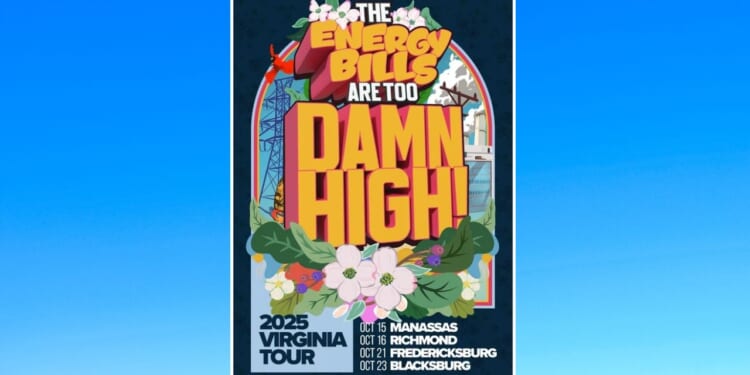Share this Story on Facebook, X, Text, LinkedIn, Gmail, Yahoo Mail, or Outlook
“The energy bills are…” shouts the emcee on the stage. “Too damn high,” comes the immediate response from a crowded meeting room in the east end of Richmond, October 16.
That call and response mantra constantly punctuated a long and creative presentation on Virginia’s energy dilemma from the point of view of the activist group Clean Virginia. The point of view varies greatly from the Thomas Jefferson Institute’s views on why electricity prices have been rising in Virginia and are likely to rise even more.
The rising cost of living and the pinch it creates on Virginia’s families and businesses is arguably the political issue in this 2025 election season that has the broadest impact. Everybody needs electricity.
As the campaign season comes to its close, Democrats have spent far more time talking about rising energy costs than have most Republican candidates. Politics like nature abhors a vacuum. Rising energy prices and the wave of data center electricity demand have created another of those “giant sucking sounds” that concern voters, rightly.
Clean Virginia, Virginia’s largest non-party, non-corporate campaign donor, is using its rallies to shape voter opinions for November and the legislative agenda for the coming 2026 General Assembly.
Argue with Clean Virginia’s interpretation and recommendations as much as you want (and we do), the event itself – one of four across the state this month – was a clever show, packed with punchy progressive messaging that was clearly being enjoyed by the audience of mostly young activists. The tee shirts with the slogan were tempting, because Thomas Jefferson Insitute agrees bills are higher than they should be.
Democratic nominee for Lieutenant Governor Gazala Hashmi was there to align herself with the Clean Virginia approach, as were several Democratic House of Delegates members or candidates. (Most like Hashmi have received financial support from Clean Virginia.) There likely was not a single undecided voter in the room, but all the tools of modern social media were being used to record and extend the reach of the message on all the varied platforms.
Which is the deep irony, because there were two villains constantly being assaulted as the culprits for the higher bills, and one of them was the burgeoning Virginia-based data center industry that makes that cloud-based communication possible. The other villain? Dominion Energy Virginia, of course, depicted in one presentation as a “vampire squid” “greedily sucking up resources” and “infiltrating every level of government.”
The disdain extends beyond that one utility, which serves only part of Virginia after all. “Corporate greed and unchecked utility power have rigged the system against us” is the tag line on the tour website, www.toodamnhigh.org. But Clean Virginia has always been mainly focused on Dominion, and candidates who accept funding from Clean Virginia agree to decline money from Dominion and other utilities.
In a segment modeled on the old “The Price is Right” television show (how many of those young folks ever saw that?), the questions posed were all chosen to drive home the main points. A data center uses the same amount of electricity as how many homes? (100,000 they said.) Dominion’s pending proposed rate increase adds how much to a typical home bill? ($257 per year). How much is Dominion’s CEO paid? ($12 million was the answer given, and the crowd then booed CEO Robert Blue, one of the most important Democrats in Virginia.)
The crowd’s excitement level dropped but the depth of content rose when Clean Virginia Executive Director Brennan Gilmore did an interview with Henrico State Senator Schuyler VanValkenberg. The themes were still the data centers and the undue political influence enjoyed by Dominion because of Virginia’s allowance of unlimited donations, with an added dose of condemnation of natural gas as a power generation fuel.
VanValkenberg did warn listeners that if they really want to prevent the expansion of Virginia’s reliance on natural gas generators, as Dominion proposes, given the coming spike in customer demand, “Democrats have to get real about building clean energy…we have to take the hard votes.”
If a listener thought he was building up to an endorsement of nuclear power as the alternative to hydrocarbons, because something dependable is needed, that wasn’t where he was going. He concluded the state must overcome the barriers that have prevented approval of massive utility scale solar facilities in many localities all around the state, a bill that died last year because Democrats were not unified behind it.
Clean Virginia was passing out and has posted a long list of legislative goals, but the bill to give the state control over large renewable project approvals was not on it. Its public list opens with calls for a ban on political contributions from regulated entities and donation limits for everybody else, along with improved transparency and enforcement. But the group moved far beyond that initial stance in about 20 more bullet points.
It proposes a direct tax on data centers “to fund household energy relief, new clean energy and grid improvements.” The state should have “more oversight on data center energy use” and should require the facilities to build their own on-site solar and storage back-up systems. Promoting solar energy and storage are a central theme.
Many of the ideas are worth discussing, such as extending rather than reducing the time between utility rate reviews, and reviewing the profit incentives used in traditional ratemaking, incentives which do use guaranteed profits to encourage utilities to build generation and transmission. Some ideas, however, are industry rent-seeking (“allow local governments and large customers to shop for clean energy.”)
Clean Virginia has its plan, and Democratic nominee for Governor Abigail Spanberger has another, somewhat similar but shorter on details (she does mention nuclear power).
The issue is raging in several House of Delegates campaigns, but Republican gubernatorial nominee Winsome Earle-Sears has not made rising energy costs, why they have risen and how to control them a central campaign theme other than occasional mentions, usually when asked.
There is an easy case to be made that policies promoted by Spanberger and Clean Virginia will add to the higher prices, not lower them, and the Thomas Jefferson Institute has been making that argument for years. The opportunity to amplify that with the voters is passing. Maybe we needed a tee shirt.

Steve Haner is a Senior Fellow for Environment and Energy Policy. Steve Haner can be reached at Steve@thomasjeffersoninst.org
Share this Story on Facebook, X, Text, LinkedIn, Gmail, Yahoo Mail, or Outlook











